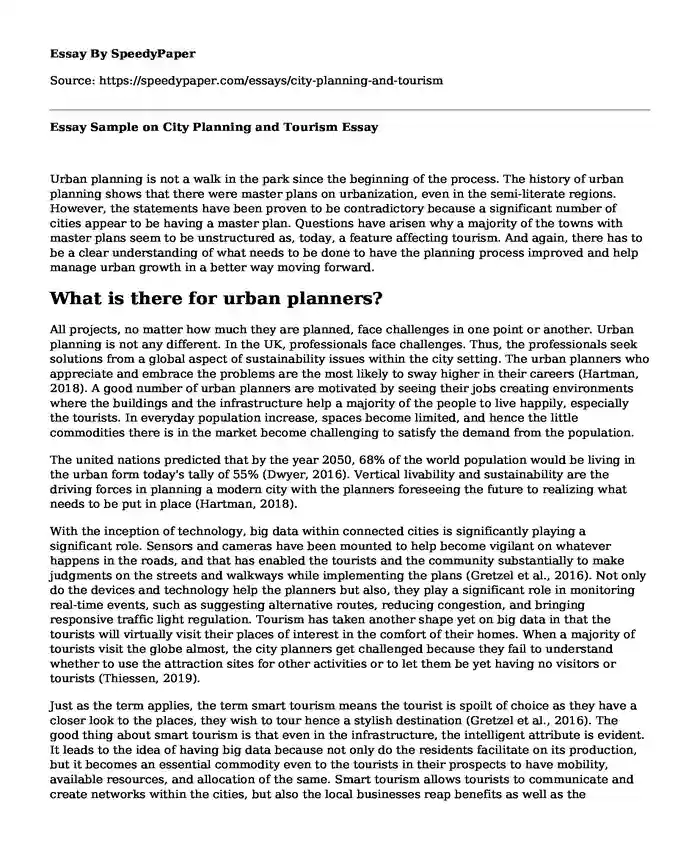
| Type of paper: | Essay |
| Categories: | Planning Government Tourism Architecture |
| Pages: | 3 |
| Wordcount: | 683 words |
Urban planning is not a walk in the park since the beginning of the process. The history of urban planning shows that there were master plans on urbanization, even in the semi-literate regions. However, the statements have been proven to be contradictory because a significant number of cities appear to be having a master plan. Questions have arisen why a majority of the towns with master plans seem to be unstructured as, today, a feature affecting tourism. And again, there has to be a clear understanding of what needs to be done to have the planning process improved and help manage urban growth in a better way moving forward.
What is there for urban planners?
All projects, no matter how much they are planned, face challenges in one point or another. Urban planning is not any different. In the UK, professionals face challenges. Thus, the professionals seek solutions from a global aspect of sustainability issues within the city setting. The urban planners who appreciate and embrace the problems are the most likely to sway higher in their careers (Hartman, 2018). A good number of urban planners are motivated by seeing their jobs creating environments where the buildings and the infrastructure help a majority of the people to live happily, especially the tourists. In everyday population increase, spaces become limited, and hence the little commodities there is in the market become challenging to satisfy the demand from the population.
The united nations predicted that by the year 2050, 68% of the world population would be living in the urban form today's tally of 55% (Dwyer, 2016). Vertical livability and sustainability are the driving forces in planning a modern city with the planners foreseeing the future to realizing what needs to be put in place (Hartman, 2018).
With the inception of technology, big data within connected cities is significantly playing a significant role. Sensors and cameras have been mounted to help become vigilant on whatever happens in the roads, and that has enabled the tourists and the community substantially to make judgments on the streets and walkways while implementing the plans (Gretzel et al., 2016). Not only do the devices and technology help the planners but also, they play a significant role in monitoring real-time events, such as suggesting alternative routes, reducing congestion, and bringing responsive traffic light regulation. Tourism has taken another shape yet on big data in that the tourists will virtually visit their places of interest in the comfort of their homes. When a majority of tourists visit the globe almost, the city planners get challenged because they fail to understand whether to use the attraction sites for other activities or to let them be yet having no visitors or tourists (Thiessen, 2019).
Just as the term applies, the term smart tourism means the tourist is spoilt of choice as they have a closer look to the places, they wish to tour hence a stylish destination (Gretzel et al., 2016). The good thing about smart tourism is that even in the infrastructure, the intelligent attribute is evident. It leads to the idea of having big data because not only do the residents facilitate on its production, but it becomes an essential commodity even to the tourists in their prospects to have mobility, available resources, and allocation of the same. Smart tourism allows tourists to communicate and create networks within the cities, but also the local businesses reap benefits as well as the government and the attraction areas (Thiessen, 2019).
References
Dwyer, L., Mistilis, N., Edwards, D., & Roman, C. (2016). Gambling with our tourism future: the role of research in destination and enterprise strategies to avoid strategic drift.
Gretzel, U., Zhong, L., & Koo, C. (2016). Application of smart tourism to cities. International Journal of Tourism Cities. https://www.emerald.com/insight/content/doi/10.1108/IJTC-04-2016-0007/full/html
Hartman, S. (2018). Resilient tourism destinations? Governance implications of bringing theories of resilience and adaptive capacity to tourism practice. Destination Resilience: Challenges and Opportunities for Destination Management and Governance, Routledge, Abingdon, 80-90. https://www.researchgate.net/publication/323119888_Resilient_Tourism_Destinations_Governance_implications_of_bringing_theories_of_resilience_and_adaptive_capacity_to_tourism_practice
Thiessen, M. (2019, September 27). For travelers, sustainability is the word-but there are many definitions of it. Retrieved May 31, 2020, from https://www.nationalgeographic.com/travel/features/what-sustainable-tourism-means/
Cite this page
Essay Sample on City Planning and Tourism. (2023, Aug 20). Retrieved from https://speedypaper.net/essays/city-planning-and-tourism
Request Removal
If you are the original author of this essay and no longer wish to have it published on the SpeedyPaper website, please click below to request its removal:
- Free Essay on Occupational Safety and Health Administration
- Gender and Biology Essay Sample
- Annotated Bibliography Example on American Constitution
- Essay Example: Differences between Primary and Secondary Sources
- Free Essay: Status and Suggestions of Multimedia Information Technology Application Teaching
- Essay Sample on Comparison Between Aerobic and Anaerobic Exercise
- James Madison: Seeking Balance of Power Through Mutual Relations - Paper Example
Popular categories




